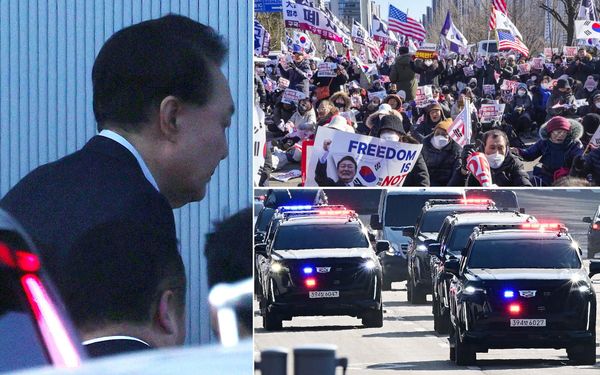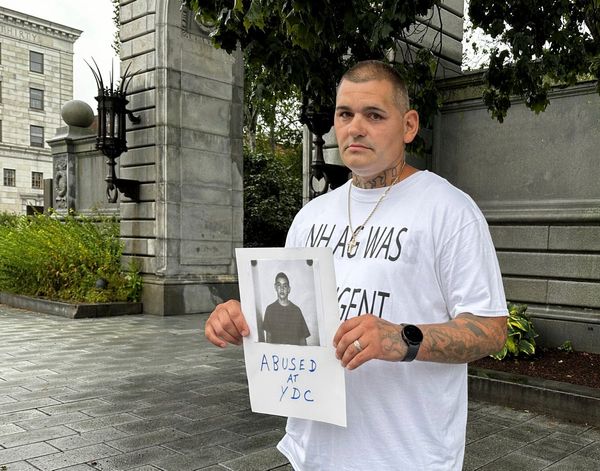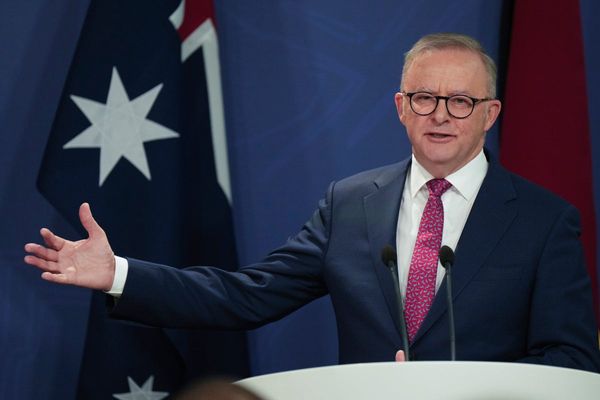CHICAGO -- The playground at St. Nicholas Cathedral School was a cacophony of voices speaking a mix of English and Ukrainian on a recent weekday, as kids swung from monkey bars and splashed in several little plastic swimming pools, a reprieve from the August heat.
One preschool student in a blue and pink swimsuit flitted from pool to pool, seamlessly switching from English to Ukrainian, depending on the native tongue of the child she was playing with in that moment.
“That’s a little translator,” said Principal Anna Cirilli, marveling at how kids seemed to find a way to play and communicate even when they don’t speak the same language. “In order for them to interact, they have to speak to each other. But you know, kids just talk to each other in their own language, it’s really weird how it happens.”
The prekindergarten through eighth grade parochial school in Chicago’s Ukrainian Village neighborhood typically enrolls a few children each year who immigrated from Ukraine. But since the Russian invasion in February, more than five dozen students fleeing the war have begun classes there, accounting for roughly one-third of the student population of about 200.
To help these new arrivals get acclimated to life in America and prepare for the fall school year — which began Thursday — St. Nicholas Cathedral School hosted an eight-week English immersion summer camp. Three dozen children participated in the program, which ran from June to early August.
Students practiced reading and writing the first four days of the week, and worked on art projects and took part in outdoor activities. On Fridays they went on field trips to explore their new city, including outings to the Lincoln Park Zoo, the Museum of Science and Industry and Navy Pier.
One seventh grade boy particularly loved a recent trip to 31st Street Beach.
“It was very, very good,” he said slowly, practicing his English. “It was very nice that you could see the town and the buildings and the water. The first month, things were very hard because we didn’t know English. But we’ve learned a lot.”
As the war hit the six-month mark on Wednesday — the 31st anniversary of Ukrainian independence — President Joe Biden announced plans to send nearly $3 billion in additional aid to train and equip armed forces in Ukraine, according to the U.S. Department of Defense. Russian President Vladimir Putin on Thursday ordered his military to boost the number of troops by 137,000 to a total of 1.15 million.
Staff members at St. Nicholas say the children experienced varying levels of trauma during their escapes from war-torn Ukraine and subsequent journeys to Chicago.
Some hid in underground parking garages for days amid Russian shelling and bombings.
Some traveled for weeks across multiple countries and arrived at the southern border of the United States, seeking asylum; others came directly to Chicago by airplane.
Many of the children had to leave behind fathers and older brothers who are still fighting in back home.
“The trauma is coming out in ways we didn’t anticipate,” Cirilli said. “But I think the highlight of the summer is seeing the growth in the kids and seeing the positives. You see more smiles. You see kids holding hands. You definitely see the friendship-building happening, and that’s the goal.”
While the focus of the camp is on academics, she said the students have also benefited from routine, structure and socialization with other kids after enduring so much chaos and turmoil.
“That’s the best thing you can do for a kid, is give them a stable, nurturing environment,” she said.
‘My heart and soul are there’
Inside one classroom, a half-dozen middle-school-age kids were gathered around a board game called Pirate Island. The players drew cards with short reading passages and had to answer questions about details in the paragraph, while attempting to evade spaces on the board marked “snakebite!” and “quicksand!”
“This group is very motivated,” Oksana Bilenka, an instructor who was leading the class.
“They’re older, they want to be part of regular classes,” Bilenka added. “They know that the more they learn in the summer the more they benefit. And they’re working very hard.”
Bilenka — who emigrated a few years ago from Ternopil, in western Ukraine — said English vowels can be particularly complicated for Ukrainian speakers to master. Each vowel in Ukrainian makes only one sound, and there are also a few diphthongs, she explained.
In English, there’s a tricky array of long vowel sounds and short vowel sounds, predictable vowel teams and unpredictable vowel teams.
“I try not to overwhelm them,” she said. “But some of the students … they want this. They are ambitious.”
While Bilenka encourages the children to speak primarily in English, she said it can be a comfort for them to know that she speaks Ukrainian.
“Psychologically, some Ukrainian students are traumatized,” she said. “We witness some reactions to things where normally they would not react. Crying, anger, like for a simple thing. Even a simple, unimportant trigger can cause a reaction. Psychologically I think, especially for the younger kids, it was very comforting for them to know that somebody speaks Ukrainian.”
Many of the children long to return to Ukraine, she said. Bilenka understands those feelings.
“It doesn’t matter that you are far away and in a safe place,” she said. “We go to bed, we check the news. We wake up in the morning, we check the news, what’s going on.”
Her mother fled the war and is now in Spain. Bilenka is trying to bring her to the Chicago area through Uniting for Ukraine, an expedited path for Ukrainians fleeing the war to take refuge in the United States, which was launched by the Biden administration in April.
As of early August, roughly 103,000 Ukrainians have arrived in the United States since the Feb. 24 full-scale Russian invasion, according to the U.S. Department of Homeland Security. This exceeded Biden’s promise to welcome 100,000 individuals displaced by the war, and federal officials have said that more Ukrainians are slated to come.
More than 6.8 million Ukrainian refugees have been recorded in Europe since February, according to United Nations data.
Bilenka hopes to visit Ternopil soon.
When asked if she’s afraid to enter a country ravaged by fighting, she said she thinks of the people who live there, disrupted by war daily.
“I really want to go to Ukraine, just for a short period of time,” she said. “Because my heart and my soul are there. I want to feel what it is to be home right now.”
Challenges, struggles
The gymnasium of St. Nicholas Cathedral School was decorated in large handmade posters of blue and yellow Ukrainian flags, bearing slogans like “glory to Ukraine” and “say no to war.”
Lockers along the hallways were labeled with the names of various campers: Vlad. Nikita. Katheryna. Dmitry. Katya. Vlada. Marharyta. Religious icons adorned walls around the school. Priests often lead prayer vigils for Ukraine and help keep families hopeful, Cirilli said.
Since arriving, some students have had disciplinary and behavioral problems that their parents had never experienced before the war, she said.
“Due to experiencing a disruption in their normal life,” she said. “From being ripped out of their home. Traveling across countries, not knowing where they will end up. The uncertainty day to day is coming out now and that’s what’s been the most difficult thing.”
These discipline meetings can be tough for both Cirilli and the parents.
“A usual discipline meeting would go, ‘This is what he did wrong, this is what needs to be fixed, end of story,’” she said. “These are difficult conversations for the families. Because they’re not used to their child acting out or behaving in an aggressive manner. But it’s all part of how they are dealing with their emotions.”
The school is searching for a social worker who speaks Ukrainian to help address these issues, she said.
Even small things like student medical forms can be challenging.
The school organized to have a medical van come so the students could get their vaccines and sports physicals completed, she said. But many of the children’s documents were just snapshots taken on phones, often hastily as their families were escaping war.
“The people in the van don’t speak Ukrainian, and don’t read or write Ukrainian,” Cirilli said.
Retired health care workers fluent in Ukrainian volunteered to help the process, but it was still difficult for them to decipher some of the records. Cirilli said each appointment that would typically take about 20 minutes ended up requiring an hour or more.
The private school also struggles with funding, since many of the newly arrived families can’t afford full tuition.
“We’re asking (families) to put it in writing. ‘What can you commit to?’” she said. “It might be a small amount. A hundred dollars a month or something like that. But at least it makes it known that this isn’t free.”
Due to capacity constraints, she fears the school might have to turn away some new Ukrainian families this year.
“That’s like your worst nightmare,” she said. “I don’t even want to meet those people because I don’t want to have to say no to their face. We’ve got to start looking at other avenues.”
She knows there are great public schools in the area that can enroll these children.
“But the environment is different,” she said. “Here, kids speak Ukrainian. The office staff speaks Ukrainian. So, when they get hurt and they need a Band-Aid, they know that someone in there is going to understand what they’re saying. Realistically, how are other schools going to do it? I don’t know. But we just can’t take it on in its entirety.”
‘Everything is magnified’
Marta Kozbur, an art teacher from River Forest, volunteered at the camp during the summer. One project she led was making birthday cards for the school custodian. Many of the students chose to decorate their cards with patriotic themes like Ukrainian flags and the guelder rose, one of the national symbols of Ukraine.
She said artwork tends to be very calming and therapeutic for many of the children.
“They’ve all had very different experiences, and some have been more traumatic than others,” she said.
One 6-year-old boy told her about fleeing to Germany, where his family stayed with an aunt who had a dog named Daisy. He excitedly told her about Daisy getting a haircut.
“He told me this story four times,” she said. “I don’t know if he realized that he was repeating himself, but I just sat there and listened. And we kind of bonded.”
One day, the boy had a minor quarrel with his sister and her friends, she said.
“He just tends to shut down, because it’s too much for him,” she said. “The trauma. The struggle to learn English, especially since they all want to go home. They feel this is so temporary: ‘Why are we learning all of this?’”
She described the incident the boy experienced as “a dust-up.”
“But everything is magnified,” she said.
So, Kozbur shared with the boy her own family’s immigration story, which in some ways mirrored his journey to Chicago.
Her mother was 7 years old when she fled Ukraine for Germany during World War II. Her mom’s last memory of life in Ukraine was a glimpse of her dollhouse as they closed the door of their family home for the final time, Kozbur said.
“My mother has said, ‘I’m reliving my childhood because I know exactly what these people are going through, because we had to do it,’” Kozbur said. “The difference is, her father was with them. But a lot of these kids are here without their dads, without their older brothers, so that’s a big difference for this group of people that are leaving Ukraine. One of the two parents is staying behind. So that creates a whole different kind of trauma.”
Her mother’s family eventually resettled in Chicago as refugees. Kozbur was born here and attended St. Nicholas Cathedral School. She and her children all speak, read and write in Ukrainian.
She thinks many of the newly arrived Ukrainian kids fear coming here might mean they’ll lose their culture, ethnicity and language.
“It’s good for the kids to see that it’s not the end of the world,” she said. “You’re not going to forget your language. You’re not going to forget your heritage. They need to see that it’s not OK — but it’s going to be OK.”







